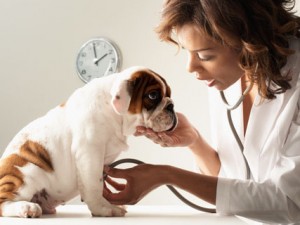How to Take Care of a Puppy

Owning a puppy can be similar to having a new younger sibling. Even though you are talking about an animal here, you will still have to take care of it. Taking care of one can be frustrating to say the least but if you know what to look out for, you might just find yourself warming up to your new furry friend. If you have just purchased a puppy, or about to get one, be sure that it is at least 8weeks old, to avoid an unhealthy way of life, as a result of leaving its mother at an early stage.
Instructions
-
1
Find a good veterinary doctor
After you must have purchased your puppy, go straight with it to the Vet for a proper checkup. This is to make sure that your puppy is healthy and free from any health complication; you would also get to know some healthy tips to keep your puppy agile. Get a Vet if you do not have one yet, or ask for recommendations. -
2
Make the most of your first vet visit
For a first time visitor, feel free to ask lots of questions that will help you in the proper care of your puppy. Ask for recommendations on puppy foods, how often to feed, the food size, and so on. Get yourself informed, to avoid being caught unawares by anything; know the kinds of diseases that your puppy is likely to have within the first few months, and how often it should pay the Vet a visit. -
3
Shop for quality food
At a point, you might have to go out and shop for food formulated especially for puppies. Read the information on the packaging to be sure that what you are about getting for your puppy is what will meet its nutritional requirements. Provide your puppy with sufficient water consistently, and feed it multiple times a day. -
4
Establish a bathroom routine
You'll have to train your puppy on a bathroom routine; this can't be escaped, else you want to take up the job of cleaning poops and smelly urines around the house, which is not cool in any sense. Train your puppy with patience, planning, and positive reinforcement. Find a place outside that you can assign to your puppy to excrete; ensure the location isn't accessible to other animals, to avoid the spread of virus and diseases.
Take your puppy out to excrete, in the morning, after eating, after a physical exercise, and before bedtime. Ensure it gets used to this routine, such that you don't have to be there before it does it. -
5
Watch out for early signs of illness
Your puppy is open to so many illnesses in its first few months; these illnesses can lead to death if not taken care of properly. Common symptoms you should watch out for are: lack of appetite, weight loss, diarrhea, wheezing/coughing, swollen eyes, vomiting, fatigue, nasal discharge, inability to pass out stool/urine, and so on. Once you spot any strange symptom, contact your Vet immediately, to avoid it getting to a chronic stage. -
6
Teach obedience
Set your puppy up for a life of positive social interaction by teaching it good manners like obedience. Words and actions like: sit, come, stop, and so on, should be common expressions between you two. Ensure it obeys your commands, and with time, it will get used to them. Interestingly, it helps strengthen the bond between you and your puppy. -
7
Allow socialization
Don't just lock up your puppy up with yourself in the house; it won't improve that way. Let it be adaptable to its surroundings; people, places, dogs and puppies like itself, and other animals. This will, in no doubt, connect it to its environment and avoid having behavioral problems.





